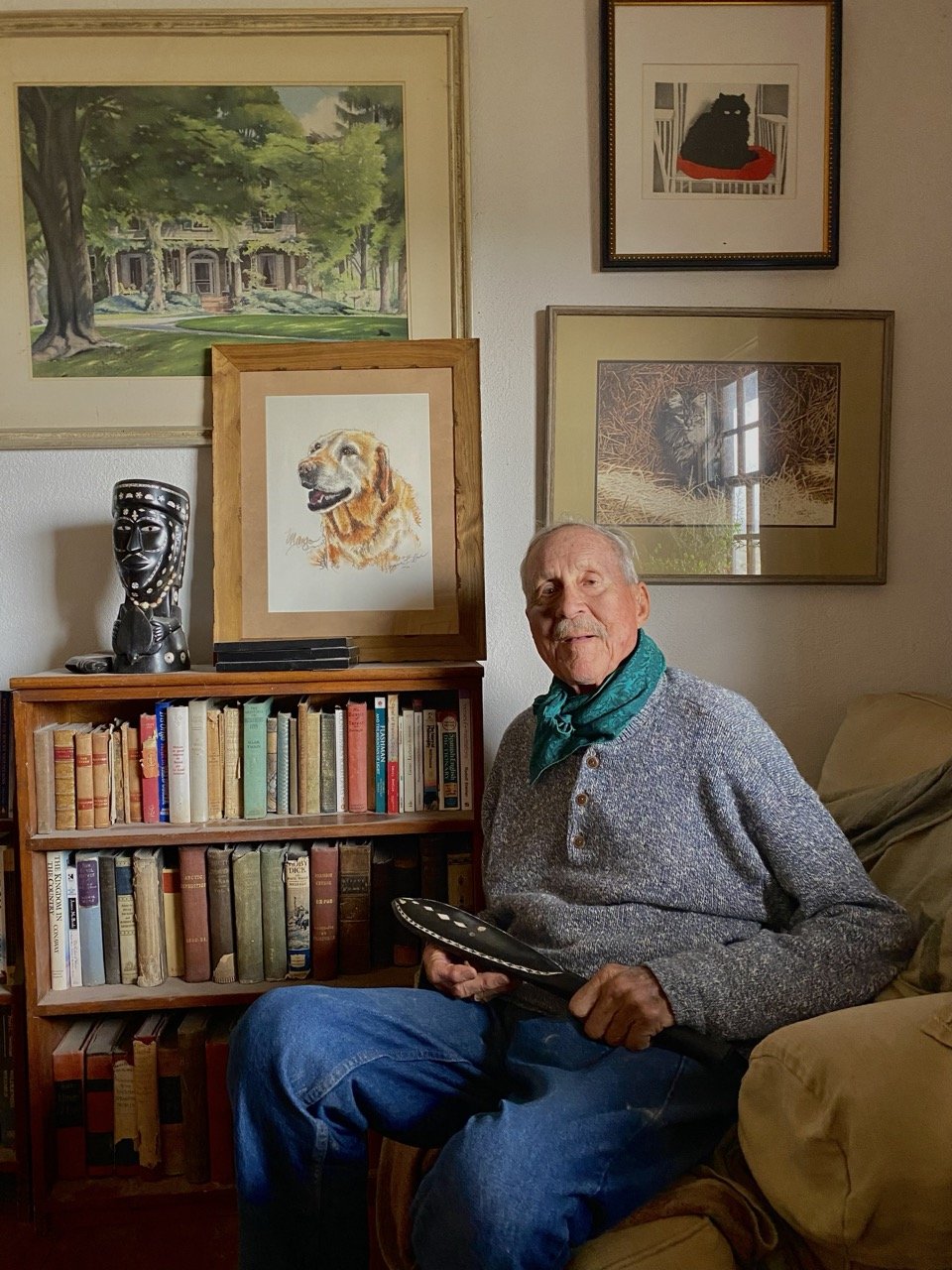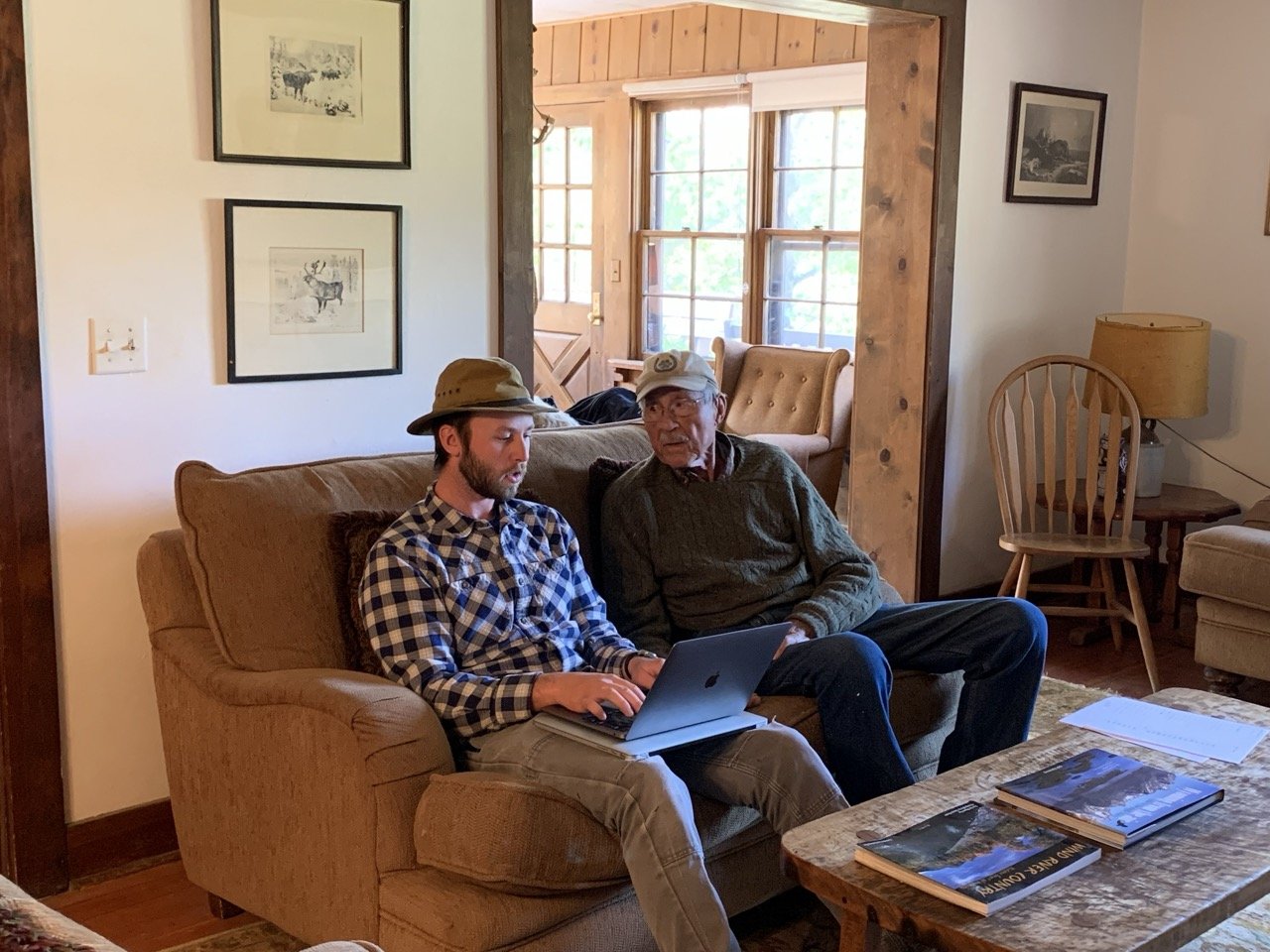I got to Wyoming in late Spring.
We drove down a 17 mile dirt driveway, put my bags in 6ft by 10ft plywood cabin, and said hello to the ranch where I’d be working for the rest of the summer.
In some ways, I knew what I was getting into. I’d known the Fox family, owners of the Bitterroot Ranch just outside Dubois, Wyoming, since I can remember. Photos of me playing with foals in the field at eight-years-old hang in my dad’s office.
But that first night lying in my bed with the rushing sound of the east fork, and the moonlight beaming through the cracks in my door, I realized this was going to be a summer unlike any I’d ever had.
My cabin, a few yards from the river
I was lucky that my guide for that time was Bayard Fox, the family patriarch, who came to Northwest Wyoming 40 years before. He bought the ranch hoping to start a new chapter in what had already been a remarkable life. Bayard grew up riding horses on a farm in Pennsylvania, was quickly recruited into the CIA after graduating from Yale, spent a year working to become a double agent in Poland during the Cold War, lived for a while while gathering intelligence in the Congo, hunted rams in Iran, and ran a lobster fishing operation in the Solomon Islands.
But on the ranch, he was most at home.
As the irrigator, it was my job to keep the fields green. That summer, Bayard, then 89 years old, drove me around on his 4-wheeler, pointing to spots in the dirt to where I should dig to divert water onto a particular patch of grass. I clung desperately to the back of his 4-wheeler as we zoomed over ditches, under pine trees, and through tall weeds. Of the 400 acres of irrigated land on his property, we must have visited every inch
On his four wheeler, far ahead of me, on an irrigation mission
We once realized we’d forgot our bear spray halfway through a walk deep into willows – prime bear habitat – only for Bayard to chuckle and say “well we better hope there are no bears!”
There were moments, after we had finished digging, or moving a fluorescent orange irrigation dam, that he would sit on his four-wheeler and share a fragment of a story, a piece of his incredible journey. Standing in a field without any human-made buildings in sight, I listened to him talk about the time his plane crash landed, or how he learned to hold his breath diving into the azure waters of the Pacific. It felt surreal.
Not only was his story true, he had a picture to prove it
I was constantly learning around Bayard. He talked about the Greeks and the Romans, and pointed out mountains to explain their geological history. He cited Herodotus and quoted Molière. Once, driving down the mountain, I asked him what advice he would give to his 23-year-old self. He smiled for a moment before telling me that often people get stuck trying to think of what to do and whether or not they are taking the wrong path. The best solution is to just try something. No matter what happens, you will learn something.
It seemed to have worked out for him.
When we weren’t irrigating, sometimes we’d plant potatoes in the garden, chopping them up and laying them out in rough rows. Or we’d drive to town for some piece of equipment or food. Occasionally he’d take me fishing to his favorite spots along the East Fork, ducking under buck and pole fences and steadying himself with a hiking pole before casting into a calm section of river and waiting for a bite.
Fishing with Mango, his beloved companion, at Brooks Lake
It turned out that 2018 was one of the last summers that Bayard taught an irrigator the ways of the land. The next summer, I came back and there was less to teach. The summer after that, much of the ranch irrigation systems were modernized.
Bayard turned to new projects, though, and I was lucky enough to be with him for some of those too. At the insistence of many guests he hosted, he finally decided to write a book – the title, Fisherman, Horseman, Rancher, Spy, was actually suggested by a guest. Though I played no part in the writing, I often visited his office to help with his computer, or to help export a file to his editor. We’d sit at his dusty table, pointing and clicking on intriguing chapter titles like “Finding Butch Cassidy” and “Tusks.”
Bayard in his office
When the book came out, he signed the inside cover for me, and I read it at my bedside. Later, I would listen to it in his voice as I worked to slowly edit the audio version.
The last time I saw him was at the ranch this July where Bayard greeted me like an old friend. “Hey Fella!” He liked to say. We sat and talked in the lodge living room on the couch. He told me about what he was reading, and how he had revised what he had written, and that the second edition would be arriving soon.
Bayard and I in 2021, working on the first edition of his book
In September of this year, at 95 years old, Bayard passed away.
In my last email to him, I talked to him about contributions, the ways in which he impacted the countless friends, guests and staff that have stayed at his ranch. I shared how grateful I was to have spent time with him over those summers, to have learned about the ways of ranch life and the world.
I am lucky that I am still very close with his family – I count them among my closest friends – and I hope the Fox-Kilgore connection will remain strong for many years to come. Still, I will miss Bayard. His presence will of course be felt in that corner of Wyoming that he so carefully cultivated.
As he might have said after a season of hard work, “So long.”
Taking Mango and me to one of his favorite fishing spots along the East Fork River
Though Bayard is gone, you can get an idea of what an incredible man he was by checking out his book, Fisherman, Horseman, Rancher, Spy or by reading some of his writing on the Equitours website About the history of horseback riding or Rides through Rajasthan in India.
I was also lucky enough to interview him for my radio show which you can listen to here






